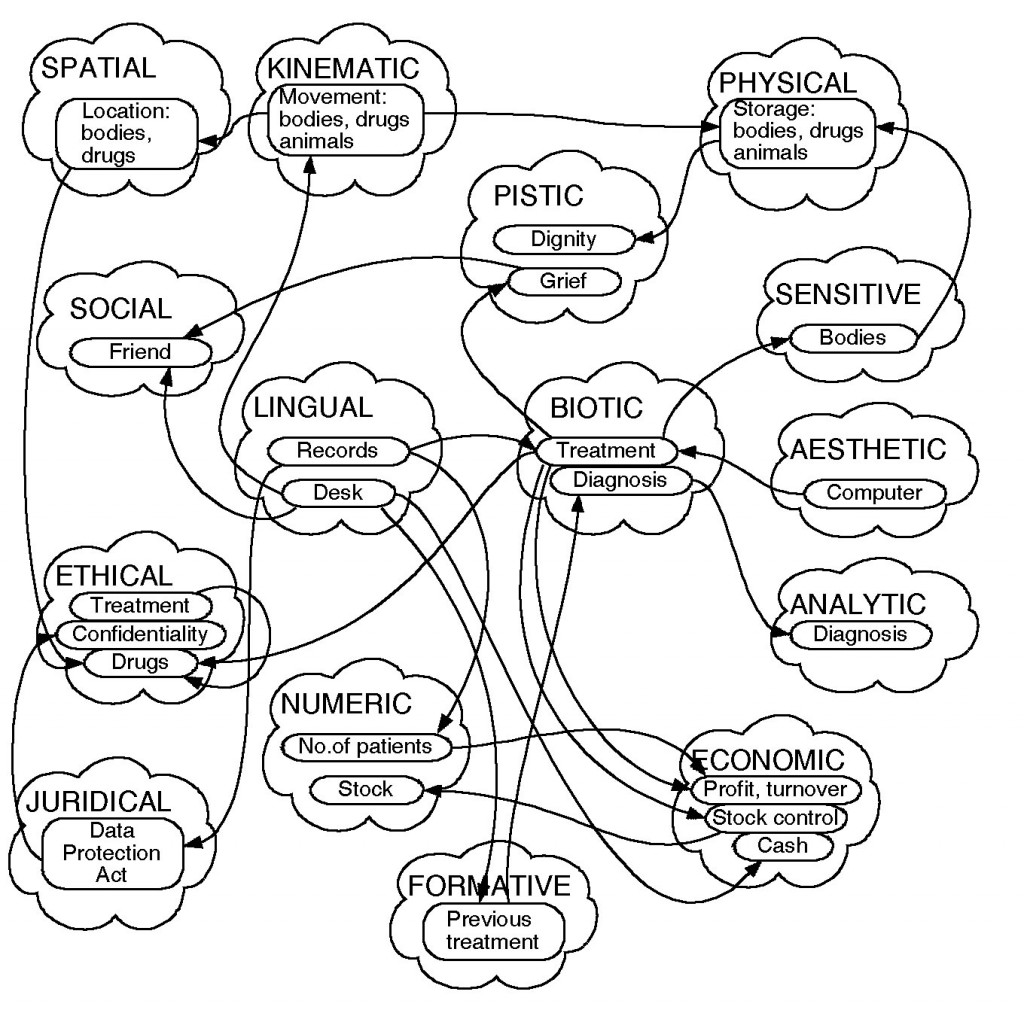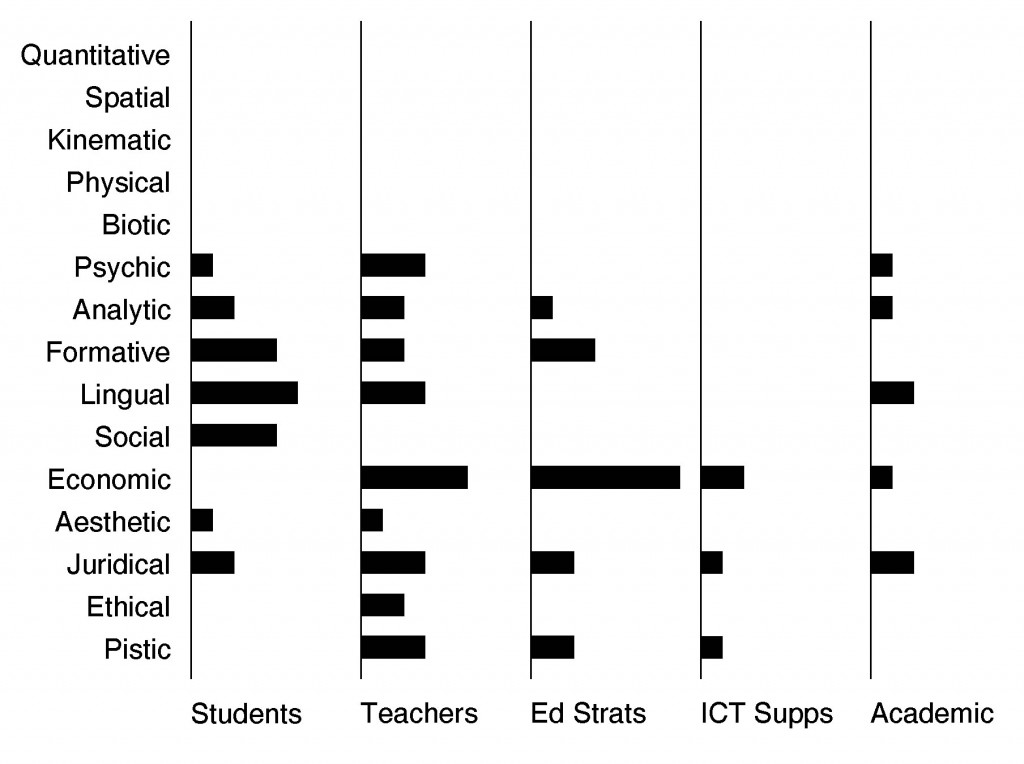
We all know it’s easy to overlook important aspects that we take for granted, and overplay the importance of others which. Doing this distorts analysis, generates ‘Groupthink’, makes plans irrelevant, and leads to failure in many projects, especially large information systems projects as we teach on the BSc Business Information Technology and MSc Information Systems Management. How do we ensure everything important is taken into account?
The aspects of human life are diverse. Yet all too often are they not reduced to financial or legal ones? If aspects are not given their due, things go awry – not only when planning an information system, but in business decision making, consultancy, strategy-setting, in environmental sustainability, politics, and in many other areas of human life. Even in the aesthetic professions, a film, novel or computer game needs to portray all aspects if it is to be fulfilling and realistic.
Several of my postgraduate students and myself have been researching around the radical philosophy of the Dutch thinker, Herman Dooyeweerd (1894-1977), and his theories of aspects. For me, he could justifiably be called the best philosopher of everyday life that has so far emerged.
Professor Andrew Basden with postgraduate students
Herman Dooyeweerd
Giving background to Dooyeweerd’s theories:
Dooyeweerd identified fifteen aspects that we encounter as important and meaningful in everyday living. Aspects, he claimed, are more than categories, they are ways in which things can function, exist, be meaningful, be rational, be good or bad, be possible, … Even human knowing has many aspects.
For example, as you are reading this, you are functioning in the following aspects; Quantitative, Spatial, Kinematic, Physical, Biotic/Organic, Sensitive/Psychic, Analytical, Formative, Lingual, Social, Economic, Aesthetic, Juridical, Ethical and Faith. For a more detailed explanation of these aspects visit The Dooyeweerd Aspects Page.
Scientific study focuses on a single aspect (e.g. physical or psychological or sociological) but every human activity and situation exhibits all aspects. Scholars are now recognising what people in everyday life have always known: Even the aspect of faith is always present, though often deeply hidden.
Philosophical analysis
Research at the University has explored methods of Aspectual Analysis, by which the analyst, thinker or researcher is kept open to all aspects and stimulated to consider ones often overlooked. This can range from informally steering discussion towards overlooked aspects, through to formally and systematically analysing a text or situation.
Dooyeweerd was very clear that no set of aspects is ever complete and will always require further refinement, but Dooyeweerd’s suite of aspects has advantages over others (such as Maslow’s hierarchy of needs), and especially over rigid philosophical ontologies like those of Hartmann and Bunge. It is more comprehensive, arising from reflection not only on everyday life but also on what thinkers have written over 3000 years. It is more philosophically based than most.
Dooyeweerd also claimed his aspects are grasped by intuition more than by theoretical thought, which makes them relatively easy to understand and work with across many cultures.
University of Salford is one of the very few institutions worldwide in which Dooyeweerd’s aspects are being seriously studied as an aid to research and analysis. The sections below précis some of the postgraduate studies, past and present, which have contributed to our research into aspectual analysis. With topics relating to knowledge of expertise, failure of e-government projects and medical records systems not quite fulfilling their expectations we can see how Dooyeweerd’s theories impact on our everyday lives.
Multi-aspectual Knowledge Elicitation ‘MAKE’, Mike Winfield
The idea of aspectual analysis really got going when Mike Winfield, then a lecturer at the University of Central England, asked me to supervise his PhD on knowledge elicitation. I explained Dooyeweerd’s aspects, and Mike at once saw its potential when interviewing experts. Referring to Dooyeweerd’s aspects can draw out the deeper and less obvious aspects of their expertise that had become tacit knowledge. The interviewees themselves identify aspects that are important in their area of expertise, bringing out issues in each one, and relating them together.
Some aspects of veterinary practice
Experts become surprised at how important the less obvious aspects are. For example, a vetinary surgeon might emphasise the biotic and economic aspects, but soon realises that the social aspect (relationship with customers), lingual aspect (clearly explaining things), ethical aspect (caring attitude to animals), faith aspect (belief in what they are doing) and so on are all important in their enterprise. In all eight cases that Mike researched, at least 13 of the 15 aspects were chosen.
Multi-aspectual Interview Technique, ‘MAIT’; Suzanne Kane
MAKE is good for eliciting expertise. But how do we interview people about their aspirations and hopes, especially when they might be timid or feel that some things are not worth mentioning? Answer: let them understand the suite of Dooyeweerd’s aspects as ‘what might be meaningful’, and speak about issues in each one.
Whereas Mike Winfield’s MAKE looks back to past or present expertise, Suzanne Kane’s MAIT looks forward to possibilities and hopes. Aspects define basic types of normative possibility. We might think that a set of 15 aspects would constrain the interviewee; in fact it freed them, enabling and encouraging them to articulate things that might seem trivial or about which they feel slightly embarrassed. Now I am honoured that Suzanne, after a time away, has returned to Salford and is now herself supervising research that employs Dooyeweerd’s aspects.
Aspects of Sustainability; Gareth Jones
One area of expertise that needed explication was that of sustainability in the context of local authority planning. So Gareth Jones built on MAKE to generate knowledge bases (which are runnable on an Amiga computer) that assist local authorities in their evaluating of land planning proposals. He built expert systems that model knowledge about each of Dooyeweerd’s aspects related to planning. Users do not receive ‘answers’ so much as are stimulated to think about issues they usually take for granted.
Since then, this experience has furnished Gareth with a broad view with which to address stategic problems in many areas of life, in both New Zealand and the UK.
Down-To-Earth Issues in Mandatory Information System Use; Hawa Ahmad
The theoretical literature on a topic like information systems (IS) use often misses the ‘down to earth’ issues that are important in real life, because of focus on what happens to interest senior managers, ICT suppliers or academic researchers. How do we reveal these unobtrusive (even hidden) down-to-earch issues? Answer: Employ Dooyeweerd’s aspects to reveal them.
Dooyeweerd’s aspects have opened up a new way to understand IS use, in terms of ‘down-to-earth’ (DTE) issues, and new ways of unearthing these issues. The challenge is that ‘down-to-earth’ issues are almost infinite in their variety and are often hidden, not emerging in ordinary qualitative research. So, instead of trying to define factors beforehand, we use Dooyeweerd’s aspects as ‘lenses’ to discern meaningful DTE issues in each real-life situation.
An interesting feature of Hawa’s empirical research, carried out in Malyasia, is that she integrated Dooyeweerd’s aspects with standard qualitative research methods, rather than setting up a rival method. Dooyeweerd’s aspects enable the analyst to give due importance to the ‘asides’, which are meaningful to interviewees, not just the issues that are of interest to the analyst. This results in both enriching the issues the interviewees mentioned and discovering hidden meanings.
Hawa is now heading up research using Dooyeweerd’s aspects in Malaysia’s International Islamic University. The University of Salford has, in effect, exported Dooyeweerd’s philosophy to another culture and continent.
Idolatry and Aspects of e-Government; Subramaniam Krishnan-Harihara
Aspects can also help us understand failure and plan for the future. Many e-government projects fail, or bring unexpected problems. Understanding this has two parts.
First, we build on the work of others researchers by adopting the ideas of Dutch economist Bob Goudzwaard to conceptualize the notion of idolatry into a framework for practical analysis. We argue that where an idolatrous attitude directs e-government projects, there is every likelihood of failure.
Second, however, we want to understand how to do something about failure. We can apply Dooyeweerd’s suite of aspects to Goudzwaard’s notion of idolatry. This throws light on how idolatry operates in relation to ICT in government and points to a potential solution to how the problem of idolatry may be overcome.
Beating Procrastination by Aspectual Analysis; Nick Breems
We all succumb to procrastination, and computers make it worse! “I’ll just check my profile for a few minutes” – and two hour’s later we guiltily get back to work. But why the computer so invites procrastination is not well understood.
Nick Breems’ research is of a philosophical nature, but with intense practicality. It addresses the question of why procrastination is such a difficult temptation when using a computer to accomplish a task. If we can understand a problem, we can perhaps do something about it.
He employs Dooyeweerd’s aspects to integrate insight from the numerous related research areas into a unified approach to understanding this problem. His new philosophically-based framework for understanding computer procrastination is more sensitive to a wider range of issues that are important in understanding why procrastination is a problem, also suggesting that there may be design alternatives that reduce the problem.
Nick is Associate Professor of Computer Science, at Dordt College, USA, and is undertaking ‘split site’ research.
Transition from paper to electronic medical record by using Dooyeweerd’s aspects; Ghadah Khojah
Why have electronic medical records not yet fully replaced paper ones despite the idea emerging forty years ago? The ambitious NHS electronic medical record system here in the UK has been cut back and other governments and health agencies such as those in Saudi Arabia, are questioning the methods being used and trying to learn from others mistakes.
This research project employs Dooyeweerd’s aspects to reveal the many issues that are often overlooked in most academic and professional discussion about medical records, which focus on a limited range, such as technology and privacy (formative and juridical aspects).
Ghadah is using Hawa’s ‘down-to-earth’ approach with Dooyeweerd’s aspects to reveal issues important in daily life of a medical ward. Ghadah’s research will point theoretical discourse about medical records towards the richness of down-to-earth issues. Practical guidelines for transition from paper to electronic records will be enriched.
This research is especially interesting because Dooyeweerd’s aspects apply across all cultures.
Paradigms of Information Systems Research; Sina Joneidy
As the historian of science, Thomas Kuhn, demonstrated, research operates by paradigms – discrete ways of viewing a field. In the field of information systems, certain paradigms have predominated, while others that are more sensitive to everyday life have been sidelined. As a result, some IS research is abstruse – some might think it a waste of time! It is important to understand the various paradigms that influence IS research, and how they fit into a wider picture of everyday reality.
The relationship between paradigms (ways of seeing) is a philosophical one, so sometimes we need philosophical as well as empirical research. Sina’s research tries to gain this wider, sensitive picture of IS paradigms using Dooyeweerd’s philosophy. The importance of Dooyeweerd’s philosophy is that it centres on meaningfulness – which is what paradigms are about.
Aspectual Analysis Applied to a ‘Wicked’ Problem; Opeoluwa Adewolu-Aiyenitaju
Some problems in society are ‘wicked problems‘ – “difficult or impossible to solve because of incomplete, contradictory and changing requirements that are often difficult to recognize. … because of complex interdependencies, the effort to solve one aspect of a wicked problem may reveal or create other problems.” [Wikipexia]. One such problem is education in developing countries, and ICT is seen as part of the solution. how do we get beyond the enthusiasm of ICT suppliers and policy makers on the one hand and the resistance to new-fangled methods on the other?
Aspectual profiles of what authors believe to be important
Opeoluwa’s research tries to address this ‘wicked’ problem using aspectual profiling, first to understand what is meaningful to stakeholders in education in Nigeria. Dooyeweerd’s aspects are adimirable for this purpose because, unlike other suites, they cover the full range of aspects – pre-human, cognitive, social and societal – in a way that understands the relationships among them.
A pilot study, undertaken during her Master’s degree, revealed there was no common view hence little possibility of collaboration. Ope’s research is significant in addressing wicked problems, and practical in contributing towards discussions of ICT in education in developing countries.
Understanding Tacit Knowledge; Alex G. Kimani
Tacit knowledge is part of our daily lives, and is crucial to effective functioning of organisations and is a major issue in the discipline of knowledge management (KM). However, a wide variety of conflicting definitions and views on the matter have arisen because tacit knowledge has been approached in different ways. To resolve the conflicts requires a new foundation for understanding tacit knowledge. Integrative foundations often come from philosophy.
Dooyeweerd’s theory of aspects has allowed us to open up the notion of tacit knowing by differentiating different ways of knowing, beyond the logical and explicit versions (analytical and lingual aspects). The project identified on which aspect each view of tacit knowledge focused which in turn revealed several distinct types of tacit knowing to include bodily knowing, skills, shared backgrounds, holistic awareness and certainty (biotic, formative, social, aesthetic, faith aspects).
Each type has different properties, and different possibility of explication. Conflicts in the literature are explained by focus on different aspects. The research emanating from this project offers a framework which unites the views of tacit knowledge, resolves conflicts and can set direction for future research in, and management of, tacit knowledge.
(Alex is now being supervised by Dr Suzanne Kane)
How can philosophical analysis help you with business decision making?
In summary, of these studies when Dooyeweerd formulated his philosophy, he did so from a Dutch Christian position. It may be seen that people from many cultures of the world, and of different religious commitments, have found his ideas valuable. Cross-cultural empathy and sensitivity to everyday experience are two of the strong points of Dooyeweerd’s philosophy. It is the University of Salford that takes a leading interest in this worldwide.
For deeper understanding of Dooyeweerd, visit The Dooyeweerd Pages at: http://www.dooy.info for which I am the gatekeeper. Do you have any views or comments on how Dooyeweerd philosophy helps you in your decision making?



Thank you
How can I have updates of new blog posts from my blog being automatically posted on my Twitter?